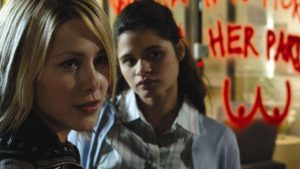- 87 minutes. Unrated.
Oo, another baby dyke trying to save the world.

Anna (Melonie Diaz) is a young, recently dumped lesbian with no degree, no motivation, and only a hugely supportive family and a resume-worthy job as a receptionist at a plastic surgery clinic to keep her going. Despite these hardships, Anna catches the eye of a radical feminist named Sadie, (Nicole Vicius) who instantly blackmails her into joining the bohemian feminist activist vandalism group Clits in Action. (Or “C(I)A,” if you prefer. See the vaginal imagery? See it??) Soon, Anna is militantly active in the group and sexually entangled with Sadie. Unfortunately for these star-crossed lovers, Sadie is a notorious player who uses her ravishing good looks to draw women into the C(I)A and meanwhile lives with her stubbornly ignorant older girlfriend Courtney. (Melanie Mayron) Drama occurs in between guerilla street art events and, long story short, Anna ends up sleeping with half of the C(I)A. This upsets Sadie, which upsets the group, which ruins everything, except that Anna has a personal epiphany about the Best Radical Art Installation Evar and they do it and it’s totally airwolf and Sadie breaks up with her girlfriend and gets with Anna and everyone’s a radical feminist lesbian forever after hooray.
Where to begin…
First of all, I recognize that IBTC is supposed to be campy and nostalgic and not entirely serious about itself. It manages to cover one of the funnest things about being an awkward young dyke: being super angry about all kinds of righteous causes. (Penises! Vaginas! The clitoris! Uh…Actually, that’s basically it. In my experience, this kind of white-hot rage tends to coincide with a burning desire to get laid. Which is also a big part of being an awkward young person.) Anyway, it’s a developmental stage that is probably most charming in retrospect. Though supportive family and positive queer role models abound, Anna and her friends embody their radical activist feminist stereotype with aggressive self-centeredness. Their kitchy vandalisms barely make the news (this is their meterstick of success) and fail to improve the lives of anyone, female or otherwise. The characters and the group are inherently silly, just like this movie.
The tagline is “Every generation needs a new revolution,” which is somewhat unfortunate. The causes that the C(I)A are interested in are serious, but also clearly fashionable within this context, and therefore reduced by association. That’s because this isn’t a movie about causes, it’s a movie about people who are into causes (my own breaking point was when Anna’s transformation into a full-fledged radical was completed by a mildly unusual hair dye job).
Otherwise, I was satisfied with the character development and direction. This is really a mainstream movie: it’s glossy, subtle, and operates on multiple levels. The story holds together both as a drama and as an affectionately satirical look at a much maligned subculture.
Nevertheless, watching the drama hit a little close to home sometimes. Some of the unlikeability that the characters displayed was due to the point that the film was trying to make about youth, but Anna’s continual tantrums did get annoying (some critics would call her an out-and-out brat; I eschew puns of such low caliber). Shulamith (Carly Pope) was hilariously spot-on and the only unrealistic thing about Sadie was that she ended up with one girl. Melanie Mayron delivered a great supporting character in Courtney. A lot of minor roles played really well, from Maude, (Leslie Grossman) the secretary/showpiece of the plastic surgery clinic, to Pam and Jan, (J. Karen Thomas and Kristina Goolsby) the straightlaced lesbian couple who Anna meets at the wedding. I also really enjoyed the cameo by Clea DuVall. She wasn’t quite as campy as she was in the 1999 camp classic But I’m A Cheerleader, but just her presence was a nice Easter egg for people who have already seen that much queer cinema. (And a little nod. This is clearly a movie that’s winking at the very people who hold queer cinema dear despite all its weirdness, difficulty to locate, and historically awful acting performances. Also, IBTC and But I’m A Cheerleader share writer/director Jamie Babbit, who is a close friend of DuVall. Incidentally, Babbit has also directed on a number of great woman-focused TV shows, including The Gilmore Girls and Rizzoli and Isles.)
Aside from the acting, which was typically fair, the good direction, decent story and fairly high production values put IBTC in the higher eschelons of campy queer cinema. It’s not boring and the fact that it’s able to make fun of itself is valuable. Both Occupiers and lesbian feminists will appreciate the joke. Eventually IBTC will be a period piece, but it’s not quaint yet. Be aware when viewing with Grandma: there’s quite a bit of nudity and lady sex.
